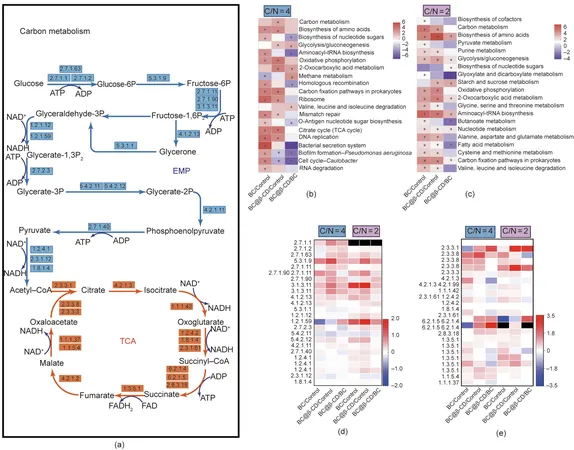
Groundbreaking Biochar Technology Revolutionizes Wastewater Treatment to Combat Nitrogen Pollution!
2024-09-27
Introduction
In an impressive leap forward for sustainable wastewater management, researchers from the Harbin Institute of Technology have unveiled a transformative approach aimed at enhancing denitrification under challenging low carbon-to-nitrogen (C/N) conditions. Published in the journal Engineering, their study introduces a cutting-edge substrate called β-cyclodextrin-functionalized biochar (BC@β-CD), which promises to redefine the efficiency of constructed wetlands (CWs) in treating wastewater.
The Challenge of Low C/N Ratios
The core issue tackled by this research is the inefficiency of traditional denitrification methods in CWs, particularly when dealing with wastewater with low C/N ratios. Such low ratios can lead to suboptimal nitrogen removal, leaving behind harmful pollutants that contribute to environmental degradation. The innovative application of BC@β-CD addresses this critical shortcoming by significantly improving nitrogen removal rates in CWs.
Experimental Approach
In the study, the research team conducted a series of experiments comparing three different CW systems: a traditional control, a simple biochar (BC) system, and the newly introduced BC@β-CD system. They specifically examined how each system performed in wastewaters with C/N ratios dramatically decreased from 4 to 2.
Remarkable Findings
The findings are nothing short of impressive. The BC@β-CD system achieved nitrogen removal rates that outstripped the traditional system by 45.89% and outperformed the biochar system by 42.48%. In addition, the innovative substrate succeeded in slashing nitrous oxide (N2O) emissions—one of the most potent greenhouse gases—by remarkable margins of 70.57% and 85.45% compared to the traditional and simple biochar systems, respectively.
Understanding BC@β-CD's Effectiveness
In their quest to uncover the science behind BC@β-CD's effectiveness, the researchers utilized various analytical techniques, including metagenomics and enzymatic assays. Their investigations confirmed that this novel biochar not only improves carbon metabolism but also enhances the activity of denitrification enzymes, all while maintaining microbial diversity within the CWs—an essential factor for overall ecosystem health.
Mechanism of Improvement
One of the standout features of BC@β-CD is its ability to improve the generation and transport of electrons, which are vital for effective denitrification. This enhancement stems from an uptick in the activities of critical components such as nicotinamide adenine dinucleotide (NADH) dehydrogenase and the electron transfer system (ETS), showcasing the substrate's prominent role in facilitating denitrification processes.
Significance of Findings
Moreover, structural equation modeling further validated that the primary strength of BC@β-CD lies in its effective reallocation of carbon metabolism flows towards denitrification. This unique capacity enables efficient nitrogen removal, even in low-carbon conditions, marking a significant advancement in wastewater treatment technologies.
Implications for Environmental Engineering
The authors of the paper highlight the substantial implications of their findings for environmental engineering and sustainability. The ability of BC@β-CD to enhance nitrogen removal efficiencies while concurrently reducing greenhouse gas emissions presents a compelling solution to one of the most pervasive issues in wastewater management—a necessity as the world grapples with pollution and environmental challenges.
Future Directions
Moving forward, researchers are keen to scale up this technology and apply it across a variety of wastewater treatment scenarios, promising a greener future for our environment. With the increasing emphasis on sustainable practices, this revolutionary study heralds a potential breakthrough for effective and eco-friendly wastewater management solutions.
Conclusion
Stay tuned for updates on this exciting advancement, as we collectively strive towards a cleaner and more sustainable planet!


 Brasil (PT)
Brasil (PT)
 Canada (EN)
Canada (EN)
 Chile (ES)
Chile (ES)
 España (ES)
España (ES)
 France (FR)
France (FR)
 Hong Kong (EN)
Hong Kong (EN)
 Italia (IT)
Italia (IT)
 日本 (JA)
日本 (JA)
 Magyarország (HU)
Magyarország (HU)
 Norge (NO)
Norge (NO)
 Polska (PL)
Polska (PL)
 Schweiz (DE)
Schweiz (DE)
 Singapore (EN)
Singapore (EN)
 Sverige (SV)
Sverige (SV)
 Suomi (FI)
Suomi (FI)
 Türkiye (TR)
Türkiye (TR)